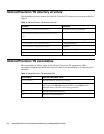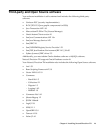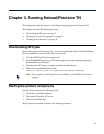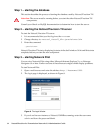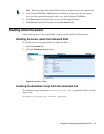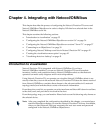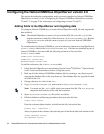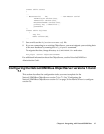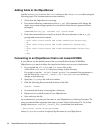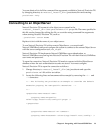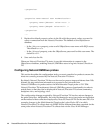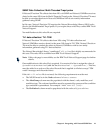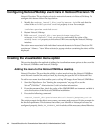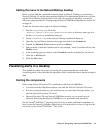
Netcool/Precision for Transmission Networks 5.5 Administration Guide36
Configuring the Netcool/OMNIbus ObjectServer version 3.6
This section describes the configuration tasks you must complete for Netcool/OMNIbus
ObjectServer version 3.6. See "Configuring the Netcool/OMNIbus ObjectServer versions
7.0 and 7.1" on page 37 for instructions on configuring versions 7.0 and 7.1.
Adding fields to the ObjectServer and migrating data
To configure Netcool/OMNIbus, you must edit the ObjectServer SQL file and migrate the
data within it.
Note: The default ObjectServer name is NCOMS and the SQL file is NCOMS.sql. In this
chapter references to this file will be shown as ObjectServername.sql. Replace
ObjectServername with the name you gave to your own Netcool/OMNIbus
ObjectServer.
To visualize alerts in Netcool/OMNIbus, you must add new elements to the ObjectServer
alerts.status table in the ObjectServername.sql file that was installed as part of
Netcool/OMNIbus. You must add the following columns to the end of the
alerts.status table:
PtnEntityID varchar(255),
PtnNative1 varchar(255),
NmosDomainName varchar(255),
To add the columns to the alerts.status table:
1. Check that the ObjectServer is not running. See the Netcool
®
/OMNIbus
™
Administration
Guide if you need instructions on how to stop the server.
2. Back up all of the Netcool/OMNIbus database files by creating a tmp directory and
copying the database files to the tmp directory. The database files are typically located
in $OMNIHOME/db.
3. Change directory to $OMNIHOME/etc.
4. Copy ObjectServername.sql and rename it ObjectServername.orig.
Note: You must use the .orig suffix when you rename this file. The nco_migrate
migration tool looks for a file with this extension.
5. Open ObjectServername.sql file with a text editor.
6. Edit the definition within the parentheses that start after this line:
create table status
Paste the columns (shown below in bold) into the file, before this line:
primary key ( Identifier ),
After you paste in the columns, the relevant part of the file should look similar to this:
create database alerts;
use database alerts;



